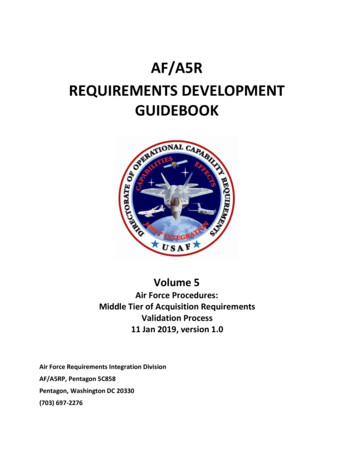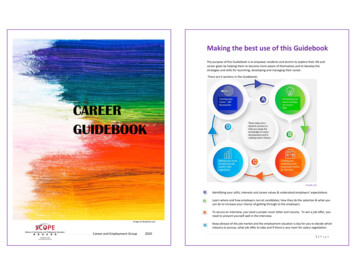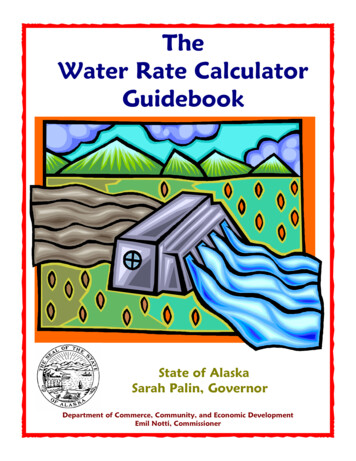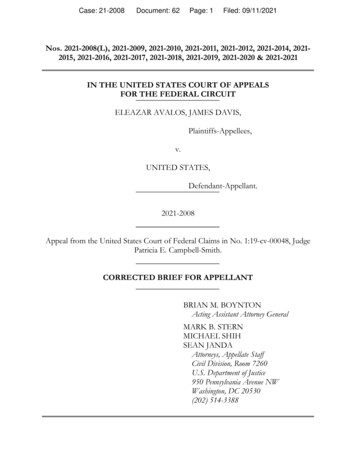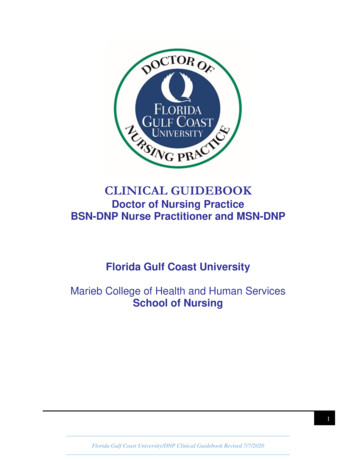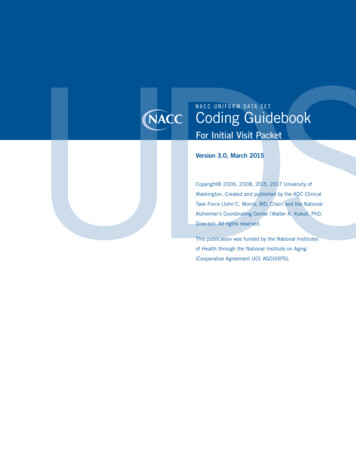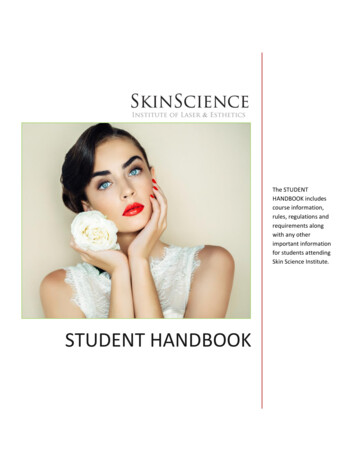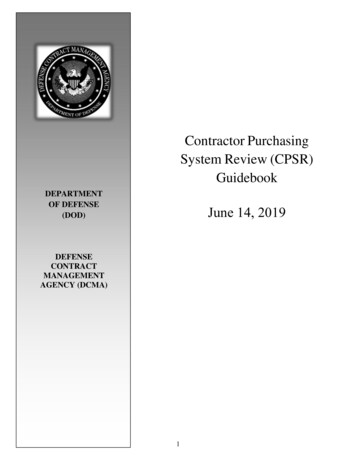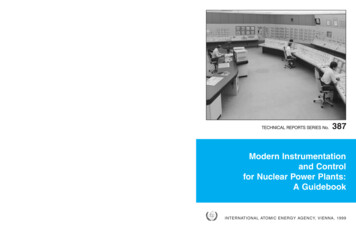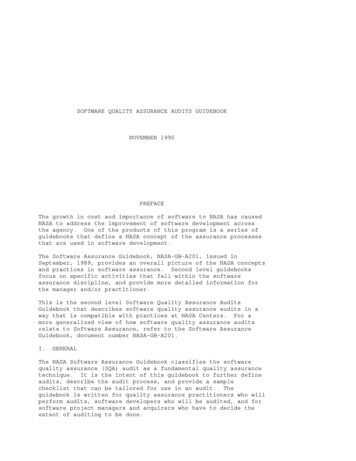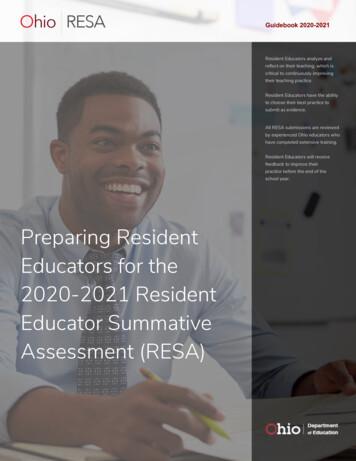
Transcription
Guidebook 2020-2021Resident Educators analyze andreflect on their teaching, which iscritical to continuously improvingtheir teaching practice.Resident Educators have the abilityto choose their best practice tosubmit as evidence.All RESA submissions are reviewedby experienced Ohio educators whohave completed extensive training.Resident Educators will receivefeedback to improve theirpractice before the end of theschool year.Preparing ResidentEducators for the2020-2021 ResidentEducator SummativeAssessment (RESA)Ohio RESA Guidebook
Dear Ohio Resident Educator,Welcome to the 2020–2021 Resident Educator Summative Assessment (RESA)!The RESA is designed to provide the following benefits: Through viewing their own practice on video and selecting the best evidence to submit,Resident Educators have a unique opportunity to analyze and reflect on their teaching,which is critical to continuously improving as an educator and successfully adjusting to newcircumstances. Resident Educators receive score reports with written feedback on their submission froman objective assessor who is an experienced Ohio educator and has completed extensivetraining. Resident Educators have time to use the written feedback to work with their facilitatorsand program coordinators to improve their practice before the end of the school year.The Ohio Resident Educator Program Team understands that this is a challenging school year, andthis year's submissions will look and sound different from past years. Assessors will give candidatesevery benefit of the doubt when reviewing evidence, especially evidence related to studentengagement. RESA scoring will not be impacted by any COVID-related face-to-face or virtualclassroom issues that may appear in the video. For the past couple years, the overall pass rate forRESA submissions has been over 98%, so candidates should view the process as an opportunity toreflect on their practice and receive written feedback from an unbiased, experienced Ohioeducator.Please note the following policy updates, which are detailed in this guidebook:1. Automatic re-scoring by a second assessor of all submissions that initially receive a failing score,2. Revised PII policy that allows selected directory information such as the students’ names toappear in the evidence, and3. Elimination of the requirement that more than half of the students are active participants.For updated guidance on recording virtual classes and an FAQ regarding COVID-related face-toface or virtual classroom issues, please visit the Resources and FAQ pages of the Ohio RESAwebsite.Remember that multiple supports are available to you such as your local program coordinator andfacilitator. You may also reach out with questions about the Resident Educator Program and RESAeligibility to REProgram@education.ohio.gov and to TeachForward at resa@teachforward.com fortechnical questions about the RESA submission process. On behalf of the Ohio Department ofEducation, thank you for all your efforts to refine and advance your teaching practice in theResident Educator Program!The Ohio Resident Educator Program Team
Table of ContentsOverview of the Ohio Resident Educator Summative Assessment . 1Lesson Reflection . 6Lesson Reflection Domains and Criteria . 13Glossary . 21RESA Submission and Scoring Policies . 23Ohio RESA System Requirements . 26Lesson Reflection Technical Reference Guide . 27RESA Modification Process. 32Accommodations for RESA Candidates with Documented Disabilities . 33Program Coordinator and Facilitator Guidelines . 35Ohio RESA Guidebook 2020-2021
Overview of the Ohio Resident EducatorSummative AssessmentThe Ohio Department of Education (ODE) requires all Ohio teachers tobegin their careers in the Ohio Resident Educator Program, under a fouryear Resident Educator license or alternative Resident Educator license.Beginning teachers, known as Resident Educators, must complete all fouryears of the program and successfully pass the Resident EducatorSummative Assessment (RESA) in order to advance their license to afive-year professional license. The Resident Educator Program and theRESA are aligned to the Ohio Standards for the Teaching Profession(OSTP). The RESA’s Lesson Reflection is carefully designed to: Reflect and reinforce the goals of the OSTP and the ResidentEducator Program. Assess the skills developed within the Resident Educator Programthat positively impact student learning and achievement. Incorporate the developmental continuum of teachers’ practice andperformance.The RESA LessonReflection providesevidence of your teachingand its impact on studentlearning based on the OhioStandards for thePurposeTeaching Profession.During their first two years of teaching, Resident Educators work withtheir assigned certified mentors to discover, practice, and refine the artand science of teaching, as they learn to self-assess, adjust theirteaching, reflect upon their progress, and strengthen their teachingpractices. Resident Educators are asked to demonstrate these teachingskills and assess their teaching performance by taking the RESA. TheRESA Lesson Reflection requires candidates to provide evidence ofteaching and its impact on student learning based on the OSTP. TheRESA was developed to be a part of Ohio’s multi-tiered teacher licensuresystem. RESA results are not intended to be used by a school or districtfor the evaluation of teacher performance or to make hiring decisions.Ohio RESA Guidebook 2020-20211
DescriptionThe RESA requires candidates to demonstrate their knowledge and skills,as revealed in their day-to-day teaching. Performance assessmentsprovide direct evidence of what teachers do in the classroom, supportedby required written commentary that accurately reflects the daily work ofteachers.The RESA consists of one task, the Lesson Reflection. ResidentEducators are asked to provide evidence of how they implement theTeaching and Learning Cycle in their teaching to support importantlearning outcomes for all students. As participants in the assessment,Resident Educators will be prompted to reflect upon and synthesize whatthey have learned throughout the Resident Educator Program. Theevidence Resident Educators collect and the commentary they submitwill demonstrate their teaching proficiency and readiness for aprofessional license. The Lesson Reflection requires teachers to submitThe RESA Lessonthree items:Reflection asks ResidentEducators to provide Teaching and Learning Context Formevidence of how they Video recording of the lessonimplement the Teaching Video Commentary and Reflection Formand Learning Cycle.Templates for the forms can be downloaded from the Resources page ofthe Ohio RESA website or the online submission system in the What INeed to Know section. A detailed description of what teachers arerequired to do can be found in the Lesson Reflection section of thisGuidebook.Submission of WorkTo complete the Lesson Reflection, teachers will be given online accessto the RESA Submission System where they will be able to downloadresources and upload their work. Teachers will have access to twosections in the RESA Submission System: What I Need to Know andWhat I Need to Submit. In the What I Need to Know section, candidatescan access an online version of the Guidebook, a video tutorial on how toupload and submit work, and templates that must be downloaded andcompleted offline. In the What I Need to Submit section, teachers willupload their completed templates and video.Ohio RESA Guidebook 2020-20212
RESA Scoring ProcessRESA assessors are all licensed teachers from the state of Ohio with atleast 10 years of teaching experience. Assessors undergo up to 10 hoursof online training, during which they learn how to consistently assess theevidence Resident Educators provide about their practice using thedomains and criteria for the assessment. Assessors also review therationales for feedback for different kinds and levels of evidence for eachaspect of the seven domains in the Lesson Reflection.Every year, prior to scoring RESA submissions, assessors must pass acertification test in which they score a set of sample submissions.Assessors must meet a minimum accuracy standard to passcertification. Assessor applicants who fail to pass certification aredeemed ineligible for scoring and do not have contact with candidatesubmissions.To control for bias, assessors are prohibited from scoring submissions ofcandidates they might know, and they are asked to defer submissions ofare all licensed teachersfrom the state of Ohiocandidates whom they recognize. Throughout the scoring process,with at least 10 years ofTeachForward’s Ohio RESA team monitors assessors for accuracy.teaching experience andmust pass a certificationIf a submission receives a failing score, it is automatically rescored bytest on the RESA beforeanother assessor who is unaware that the submission has already beenthey can reviewscored. The score and feedback from the second round of scoring aresubmissions.final.Ohio RESA Guidebook 2020-2021Assessors for the RESA3
2020–2021 RESA Registration, Submission, and Scoring TimelineCORE Registration OpensAugust 1, 2020RESA Submission System OpensOctober 13, 2020CORE Registration Deadline1November 15, 2020Account Activation Deadline2December 1, 2020Lesson Reflection Deadline3January 22, 2021RESA Score Reports ReleasedApril 9, 2021Final Day to Download Score ReportsJune 15, 20211Totake the RESA, Program Coordinators must register candidatesin the Connected Ohio Records for Educators (CORE) system.2First-timeThe RESA System openscandidates must activate their accounts and completeon October 13, 2020, andtheir profile, and returning candidates must update their profile.the deadline for submitting By completing these steps, candidates are confirming they arethe Lesson Reflection isproperly registered and can access their account.January 22, 2021 at When the submission system opens, TeachForward will send11:59PM ET.account activation emails to candidates who are registered toAfter the deadline, notake the RESA for the first time.materials may be Returning candidates are able to log in to their existingsubmitted.account and will not receive an account activation email.3Candidatesare strongly encouraged to submit at least two weeksbefore the deadline. By completing the RESA earlier in thesubmission window, candidates give themselves more time, ifnecessary, to receive technical assistance, select a different video, oredit their forms. After submitting, candidates have the option torecall their submission and resubmit before the deadline.IMPORTANT: After the deadline, candidates are not able to revisetheir submission or submit new materials.Ohio RESA Guidebook 2020-20214
Guide to RESA SupportThe RESA website, www.OhioRESA.com, is the source for all RESAinformation including resources, important updates, and ongoingcommunications.Technical questions about activating RESA accounts or submitting formsand evidence should be directed to the RESA Help Desk by emailingresa@teachforward.com. The RESA Help Desk is also available by phonein December and January.Please visit http://www.ohioresa.com/contact-us/ to view this year’sRESA Help Desk schedule and phone number.Questions related to RESA eligibility, assessment modifications, and theResident Educator Program should be sent to the Ohio Department ofEducation at OhioRESA@education.ohio.gov. Licensure questions shouldbe directed to the Office of Educator Licensure. Candidates can also findQuestions related to RESAinformation on the Ohio Department of Education Resident Educatorwebpage: -Educator-eligibility, assessmentmodifications, and theResident EducatorProgram.Program should bedirected to the OhioDepartment of Education.All technical questionsabout your RESA accountor submitting work shouldgo to the RESA Help Desk.Ohio RESA Guidebook 2020-20215
Lesson ReflectionPurposeIn this Lesson Reflection, you are asked to select a single lesson thatdemonstrates your ability to teach meaningful content to yourstudents. The careful selection of the lesson is an act of self-reflection,which is one of the most important practices of effective teaching. Youwill analyze your planning decisions for this lesson, choose anillustration of your actual teaching in a video segment that is up to 20consecutive minutes long, and reflect on the success of the entirelesson.What You Must Do1) Read the Lesson Reflection Domains and Criteria section beforeyou choose your lesson for recording.2) Choose a single lesson that allows you to demonstrate all of thefollowing:RESA candidates musta) Important content clearly connected to your school and districtpriorities, Ohio’s Learning Standards, and/or national standardsfor subject areas that do not have Ohio’s Learning Standards (youcan review Ohio’s Learning Standards on the Ohio Department ofEducation website)b) Academically rigorous expectations for student learningc) Explanation and/or demonstration of academically rigorouscontentd) Direct engagement with students during the lesson-for example,questioning strategies, explanations of content, response tostudent inquiries, and other kinds of direct engagement withstudentse) Classroom environment conducive to learning-for example,positive and respectful interactions, appropriate studentbehavior, efficient routines and procedures, and studentparticipationf) Intellectual engagement on the part of your students-not thatthey are compliant or enjoying an activity but that they arecognitively engaged and thinking about the learning that is thefocus of the lessong) Use of formative assessment to monitor student understandingand progress toward the learning outcomes of the lessonOhio RESA Guidebook 2020-20216submit the LessonReflection, which includesthe lesson video and twoforms, by 11:59PM ET onJanuary 22, 2021.
3) Record the entire lesson. The video provides an opportunity for you toshowcase particular elements of the lesson that you will subsequentlydiscuss on your Video Commentary and Reflection Form. Do not editthe video before uploading to the website.4) Upload the unedited video of the entire lesson to the website.Guidance on how to upload the video is provided in the RESASubmission System in the What I Need to Submit section. Afteruploading your video, indicate a single continuous segment that is upto 20 minutes long for the assessor’s review. Assessors will not viewany other part of the lesson video. While there is no specific minimumlength for the video segment, you should select the necessary amountof video to showcase your best teaching.5) Complete and upload the Teaching and Learning Context Form andthe Video Commentary and Reflection Form for the lesson you record.A sample template for each form is provided in this Guidebook. Do notsubmit the sample templates. The actual templates can bedownloaded from the Resources page of the Ohio RESA website orthe online submission system in the What I Need to Know section.Remember that this commentary and reflection must be your ownwork. It must not be written or edited by anyone else. Definitions ofspecific terminology used in the forms can be found in the Glossary.6) Preview your video and forms on the website to ensure they meet allthe requirements for scoring (see the Check Your Work Before YouSubmit section).Complete the LessonReflection in 4 easy steps:1.Record your lesson.2.Download andcomplete the Teachingand Learning ContextForm and the VideoCommentary andReflection Form.3.your classroom videoand select the 20minute video segment7) Submit the following by clicking on the blue Submit button in theWhat I Need to Submit section of the Ohio RESA website:online after you haveuploaded the fulla) The entire lesson video with an identified lesson segment up to20 minutes longunedited video.4.b) The Teaching and Learning Context FormAfter previewing yourvideo segment andboth forms, submit thec) The Video Commentary and Reflection FormOhio RESA Guidebook 2020-2021Upload both forms andLesson Reflection.7
Key Success Factors for the Lesson Reflection Read the Lesson Reflection Domains and Criteria section inits entirety before you choose and record your lesson or write any ofthe lesson commentary. Understanding the basis for the lessonevaluation will inform the best choice for the Lesson Reflection. Use the list in the previous What You Must Do section as a checklistfor the lesson you choose to record and analyze for the LessonReflection. When completing the Video Commentary and Reflection, be certainthat you explicitly connect the lesson’s content focus to:ü The learning outcomes for the lessonü Its overall importance in the content area (Question 2)ü How it illustrates relationships among important concepts in thediscipline (Question 3 for the overall lesson and Question 4 for theselected video segment)ü Your understanding of the prerequisite knowledge and skillsstudents need to achieve the learning outcomes for the lesson(Question 3 for the overall lesson and Question 4 for the selectedvideo segment) To help you in completingthe RESA LessonReflection, refer to theWhat You Must DoRemember that your entire recorded lesson might well be longer thanthe 20-minute video segment. In your commentary, you may need toexplain what you planned or what took place in your classroom atother points in the lesson not shown in the video segment you havechosen for assessors to review. Assessors will not have access to thevideo beyond what is shown in the selected segment.Ohio RESA Guidebook 2020-20218section. This checklist isalso available as adownloadable resource inthe online submissionsystem.
Check Your Work Before You Submit For your submission to be scored, it must meet the followingrequirements:ü Forms are visible and clearly legible. Candidates must previewtheir forms on the website to ensure every page is visible andclearly legible.ü Video’s sound, visual quality, and angle allow an assessor toclearly see and hear the students and Resident Educator. Notevery student needs to be visible or heard; however, the videoshould include evidence of the Resident Educator’s directengagement with the students and the students’ intellectualengagement during the lesson.ü Video evidence is authentic, without editing or noticeable timelapses.ü Video segment shows a lesson conducted in a single class period.ü Video segment portrays the learning outcomes stated in the VideoCommentary and Reflection Form.ü Does not contain sensitive personally identifiable information(PII), which includes financial account numbers, medicalinformation, Social Security numbers, driver's license numbers,and passport numbers. Note: a submission will be scored if it contains directoryinformation, which includes first and last names, streetaddresses, email addresses, and phone numbers. Inaddition, a submission will be scored if it shows a schoolname, logo, and/or mascot. The teaching evidence and analysis submitted as part of this LessonReflection must be your work and yours alone. Any ResidentEducator who cheats or tries to cheat on the RESA will receive afailing score and will be reported to the ODE Office ofProfessional Conduct. It is considered cheating to re-use videoevidence from any past RESA submission. Notice for Resident Educators in co-teaching assignments or forthose who teach with other adults in the room: If you are in a coteaching assignment and the other co-teacher is also submitting aLesson Reflection, you are prohibited from using the same lessonin your Lesson Reflection. If you are teaching in the same room withanother adult, indicate whose teaching should be reviewed inQuestion 5 of the Teaching and Learning Context Form associatedwith the video (for example, “I’m the teacher in the blue shirt”).Ohio RESA Guidebook 2020-20219
Teaching and Learning Context Form**This is a sample template. The actual templates can be downloaded from the Ohio RESA website or the onlinesubmission system in the What I Need to Know section.Complete the following Teaching and Learning Context Form for the lesson you have selected toprovide information about the students in the class. Your responses on this form will provide criticalinformation that will help assessors understand and interpret the Lesson Reflection. Once you are readyto submit, you may upload the completed form to the RESA Submission System. You are advised tokeep a copy of this completed form for your records.1. School Setting/EnvironmentSetting:For example: traditional elementary/middle/high school; school for the blind; magnet school for science andMROFEmathematics; online education program; juvenile detention center.2. Identify the subject area and title of the course (for example, third-grade reading or U.S. History1) in which this lesson was taught.Subject:3. Grade Level/sGrade Level:LPMAS4. Number of Students in This ClassTotal Number of Students:English Language Learners:Students with Learning Disabilities:Gifted and Talented Students:Students with Exceptionalities*:*Exceptionalities include the following categories: developmental delays, emotional and behavioraldisorders, communication disorders, hearing disabilities, visual impairments, and physical disabilities.5. If there are other adults or you are co-teaching with someone else in the video, please describehow you are to be identified in the video.Please explain how you will beidentified in the video:Ohio RESA Guidebook 2020-202110
Video Commentary and Reflection Form**This is a sample template. The actual templates can be downloaded from the Ohio RESA website or the onlinesubmission system in the What I Need to Know section.Complete the following Video Commentary and Reflection Form about the learning outcomes andoverall structure of the lesson you have selected. This lesson overview must describe the lesson youcaptured in the video.Each response should be complete and concise. Each response should not exceed 250 words(approximately half a page, single-spaced). For some responses, you may choose to respond in abulleted list, in whole or in part.We suggest that you write a first draft and carefully edit before you complete each answer on this form.Once you are satisfied with the form, you may upload it along with the Teaching and Learning ContextForm and the video.MROFE1. List the learning outcomes for this lesson, in the table below, and explain (a) why the outcomesare academically rigorous and (b) how they are connected to your school and/or district prioritiesand Ohio’s Learning Standards or relevant national standards if Ohio’s Learning Standards donot apply. (Lesson Reflection Domain 1)LPMASList the learning outcomes.Explain why these learning outcomes are academically rigorous.How are these learning outcomes connected to both your school and/or district prioritiesand Ohio’s Learning Standards or relevant national standards?2. Describe the selected lesson’s content focus and its importance to the overall content area.(Lesson Reflection Domain 2)Ohio RESA Guidebook 2020-202111
3. Describe the prior knowledge and skills (including general language skills and academic languageskills) students must have in order to achieve the learning outcomes for this lesson. Be sure todemonstrate your knowledge of how important concepts in the discipline relate to one anotherand your understanding of prerequisite relationships among topics and concepts that studentsneed in order to understand the focus of this lesson. (Lesson Reflection Domain 2)Describe anything that happened in your classroom just prior to the selected video segment that youbelieve will help the assessor understand the context. (“Just prior” means that it occurred in theminutes before the segment you have chosen begins or, in the case of a segment that shows thebeginning of the class, the day before this class.) This response is provided as context for theassessment of your analyses below. This critical information will help assessors understand andinterpret the parts of the submission that are the focus of evaluative feedback.4. What aspect of the content focus of this lesson is illustrated in the video segment? Why is thisaspect of the content focus important? Be sure that you point out how the content focus of thevideo illustrates relationships among important concepts in the discipline and how yourunderstanding of prerequisite relationships among topics and concepts in the discipline isdemonstrated in this segment. (Lesson Reflection Domain 2)5. Describe the specific method of formative assessment you used to assess student progresstoward the learning outcomes for this lesson. Why is this method useful as a check-in point forstudent progress toward the learning outcomes of this lesson? (Lesson Reflection Domain 6)6. How successful was this entire lesson in relation to the learning outcomes stated in your lessonoverview? Be specific in your answer and explain what evidence (e.g., student behaviors,responses) supports your answer. (Lesson Reflection Domain 7)7. Which of your selected instructional strategies for this entire lesson was/were most successful insupporting the range of student understandings and varied learning needs of students in thisclass? (Lesson Reflection Domain 7)8. Which instructional strategies, if any, would you change in re-teaching this lesson and why?Explain what you would do instead. If you would not change anything, explain why. (LessonReflection Domain 7)Ohio RESA Guidebook 2020-202112
Lesson Reflection Domains and CriteriaLesson Reflection Domain 1: Quality of Learning OutcomesEvidence Source: Resident Educator’s response to Question 11. List the learning outcomes for this lesson, in the table below, and explain (a) why the outcomes areacademically rigorous and (b) how they are connected to your school and/or district priorities andOhio’s Learning Standards or relevant national standards if Ohio’s Learning Standards do not apply.CriterionAssessors are looking for the extent to which the teacher’s stated learning outcomes as a whole arecharacterized by most of the following: high expectations for students consistent evidence of academic rigor in the discipline clear and specific connection with school and/or district curriculum priorities and state academiccontent standardsEvidenceStrongWeak High expectations for studentsConsistent evidence of academic rigor in the disciplineClear and specific connection with standards and prioritiesSome high expectations for studentsSome indication of high levels of academic rigor in the disciplineGenerally clear connection to standards and prioritiesModerate expectations for studentsModerate academic rigor in the disciplineVague or unclear connection to standards and prioritiesLow expectations for studentsLack of academic rigor in the disciplineOhio RESA Guidebook 2020-202113
Lesson Reflection Domain 2: Teacher’s Knowledge of ContentEvidence Source: Resident Educator’s responses to Questions 2, 3, and 4 and the video segment2. Describe the selected lesson’s content focus and its importance to the overall content area.3. Describe the prior knowledge and skills (including general language skills and academic languageskills) students must have in order to achieve the learning outcomes for this lesson. Be sure todemonstrate your knowledge of how important concepts in the discipline relate to one another andyour understanding of prerequisite relationships among topics and concepts that students need tounderstand the focus of this lesson.4. What aspect of the content focus of this lesson is illustrated in the video segment? Why is thisaspect of the content focus important? Be sure that you point out how the content focus of the videoillustrates relationships among important concepts in the discipline and how your understanding ofprerequisite relationships among topics and concepts in the discipline is demonstrated in thissegment.CriterionAssessors are looking for the extent to which the teacher’s materials reflect this level of achievement: The teacher demonstrates extensive knowledge of the important concepts in the discipline and howthese concepts relate to one another. The teacher displays clear and precise understanding of prerequisite relationships among topics andconcepts.Strong Extensive knowledge of the important concepts in the discipline and how theseconcepts relate to one another Clear and precise understanding of prerequisite relationships among topics andconcepts Accurate understanding of important concepts in the discipline and how theseEvidenceconcepts relate to one another Accurate understanding of prerequisite relationships among topics andconcepts Familiarity with important concepts in the dis
The Ohio Department of Education (ODE) requires all Ohio teachers to begin their careers in the Ohio Resident Educator Program, under a four-year Resident Educator license or alternative Resident Educator license. Beginning teachers, known as Resident Educators, must complete all four years of the program and successfully pass the Resident Educator
